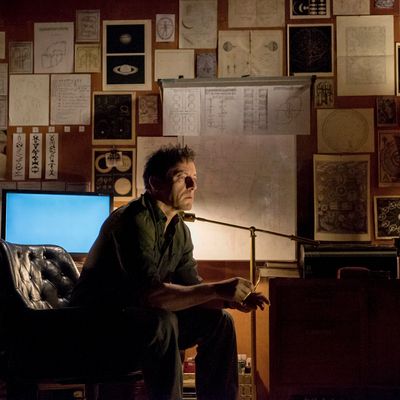
The penultimate episode of The OA is pivotal, but not in the way you might expect. Little groundwork is laid for the finale; few mysteries are solved; no one character has any major turning points. Instead, ÔÇ£Empire of LightÔÇØ is a pivot of a more disappointing variety. After sustaining a satisfying mood for so long, this is a characteristic letting-the-wind-out-of-the-sails moment.
Entirely flashback-free, Empire of Light serves the clear purpose of letting us see the serenity of OAs suburban makeshift family, as contrasted with her utter disdain for her adopted parents. To be fair, the show sorely needed moments like the one where the group gently ribs Steve for his new romance; as recently as the last episode, I was wishing to just see more of these people interacting together, so we would have greater cause to believe they were bonding. But to do this all at once, while ignoring the rising action of the interdimensional portals and angel-hunting escapades, right before were supposed to be wrapping things up  well, its jarring. And tonally mucky. And, on the level of viewing pleasure, immensely dissatisfying  as though series creators Brit Marling and Zal Batmanglij had a checklist in front of them and suddenly realized theyd forgotten to scratch off this particular item.
Throughout this season, The OA has struggled to balance its fantastical elements with a clear motivation to tell relatable, personal stories about real people. ThereÔÇÖs a way each of these two universes could work together in theory, but it would have required The OA to push its metaphysical side even further (much like MarlingÔÇÖs films have), and avoid reconciling its protagonistÔÇÖs outrageous story with the reality of her present. When weÔÇÖre reminded, for example, that a formerly blind woman who miraculously resurfaces with sight intact would be an internet celebrity, or that the scars on her back are still unexplainable to most of the world ÔÇö┬áboth parts of which resurface in the interminable restaurant scene where a random girl accosts OA for a selfie and calls her the ÔÇ£Michigan MiracleÔÇØ ÔÇö the show gets bogged down with all the dead air that comes with such an explanation. Why did we need it?
This episode also presents some of the clumsiest writing of the series to date: Though Phyllis Smith has certainly proven with The Office that she can sell an absurd line of dialogue with deadpan sincerity, having her yell a desperate, false molestation charge outside a gas station ÔÇö not to mention forking over her brotherÔÇÖs entire life-insurance check to keep Steve (Patrick Gibson) in the picture ÔÇö is a bit much. Then, later, in case you werenÔÇÖt paying attention during the previous six episodes, we get the dreaded Series Recap, delivered in the form of Alfonso (Brandon Perea) reminding the OA about all the things sheÔÇÖs already told them (and us). ItÔÇÖs a buildup to the suggestion that the now-confirmed ÔÇ£Original AngelÔÇØ spend a little bit more time bonding with her parents, whom sheÔÇÖs callously dismissed as roadblocks between her and eternity.
That would be a more promising dramatic pivot if the ways the OA and the Johnsons perceive reality didnÔÇÖt seem so fundamentally irreconcilable. By keeping the Johnsons on the outside looking in for so long, this show has subtly demonized them as too normal to understand anything, so this ninth-inning pitch for sympathy feels canned. ItÔÇÖs simply too little, too late.
ItÔÇÖs also unlikely the finale will be able to do all the work necessary to fully merge The OAÔÇÖs two worlds. Still, even at its most lethargic and disappointing, the series has a unique kind of magic to it, a magic once more on display in ÔÇ£Empire of Light.ÔÇØ The slow-burning zoom in the FBI office, with the alien nature of that glassy multilevel structure, is pure visual candy. I certainly enjoyed this episodeÔÇÖs analogy to ÔÇ£totems,ÔÇØ small objects and symbols that carry great personal significance, because the entire show is very much an exploration of totems. If we are to allow for the possibility that OA is simply delusional, and isnÔÇÖt really an angel, all we have left to hang our hats on are the tangible things: the scars on her back, the dance movements. Separately, they seem the products of a damaged mind; together, itÔÇÖs possible to construct a belief system from them, one that grants hope and purpose to a disparate group of people.
Will these totems continue to have meaning once all is said and done? (Or not done?) WeÔÇÖll have to see for certain in the conclusion. Although one shouldnÔÇÖt fault a piece of popular art for having ambition, itÔÇÖs worth asking if The OA has lived up to its own promise in this homestretch, or if the showÔÇÖs serious shift in focus is less the product of nontraditional storytelling and more a way to artificially extend a thin narrative.
Stray Observations:
- Steve gets to live out his personal-trainer-to-the-stars aspirations as an interpretive dance coach for his fellow OA acolytes.
- The Johnsons have gotten short shrift throughout this series, but you can feel it most acutely in the moment when, after the OAÔÇÖs hour-long therapy session with the FBI agent, they learn she never once brought them up. ItÔÇÖs a painful realization.
- Although IÔÇÖm a big fan of MarlingÔÇÖs deliberately glassy performance, we havenÔÇÖt seen very many wrinkles to her character, who mostly seems content to play the role of solemn prophet. This episode contains hints of what The OA could have pursued more by establishing that Prairie is very emotionally immature, practically a child, when it comes to wrestling with her feelings and confronting her past. Is she using this angel stuff to deflect from the truly painful conversations that lie underneath?
- Alan SepinwallÔÇÖs spoiler-free critiques of the show are worth reading, even though I was more taken with the dynamic risk-taking of the showÔÇÖs early stretch than he was.

